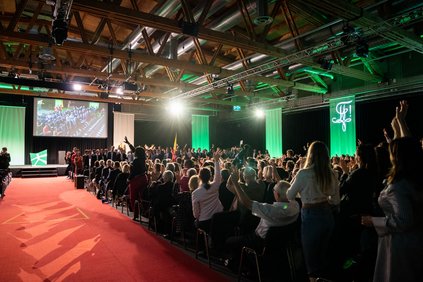Campus - 07.08.2019 - 00:00
The SHSG’s Summer Coding Bootcamp – the second round of a successful project
This year, the SHSG Summer School will take place from 21 August to 4 September 2019. In this interview, SHSG President Florian Wußmann talks about how this successful student-run project has developed. By student reporter Sascha Duric.

7 August 2019. The SHSG Summer School first took place last summer. In the course of ten informative days, participants were able to acquire fundamental programming knowledge and attend numerous workshops in crypto and blockchain, machine learning, web development and the internet of things. It was clear even at that stage that this would not be the last Summer School.
Florian, the SHSG’s Summer School is already a success project. How did this idea actually come about?
The basic idea for the Summer School originated in a need that students mentioned to us time and again, namely that the working world requires them to have skills in the digital sphere, fundamental programming knowledge and an understanding of technology. In this respect, the HSG still lacked the resources necessary to satisfy this student need. Also, the HSG had to wait for the outcome of the vote on the cantonal education offensive in February 2019. As the SHSG, we’re considerably more flexible in this respect and so we developed this project to respond to these requirements in good time.
The Summer School will now take place for the second time from 21 August to 4 September 2019. What awaits this year’s participants?
Similarly to last year, the programme will consist of three parts. In the first part, participants will be introduced to the fundamentals of programming. The second part will consist of input sessions by our practice partners. In contrast to last year, the input sessions will be divided up into two tracks. The first track will focus on web development and AI/ML and the second track on blockchain and the IoT. This will be followed by a third part, in which participants will be able to apply their newly acquired knowledge in a project of their own. In addition, we’ve scheduled an excursion to our practice partner Swisscom, where we’ll visit their Datacenter in Zurich. Also, this year we’ll stage a small conference to conclude the Summer School.
This year’s Summer School will now be part of the HSG’s contextual studies, which means that participants will be awarded 2 ECTS credits at the Bachelor’s Level and 3 ECTS credits at the Master’s Level if they so wish.
There’s really no getting away from IT training any longer. Why would you recommend that all the students should attend the SHSG Summer School?
The basic idea is that we want to train future executives, who should have a fundamental understanding of IT. Regardless of their individual majors, many HSG students will be confronted by those technologies which we teach at the Summer School in the course of their later careers. The importance of these issues is also reflected in the new Business Administration reform, in which the HSG has integrated IT into its core studies. In order to avoid overlaps in this respect, we’ve discouraged Assessment Year students from participating in this year’s Summer School. However, we’ll further optimise our courses and adapt them to the new Business Administration reform to ensure that we’ll be able to offer an optimal programme to all the students next year.
Is there still a possibility for spontaneous registration for this year’s Summer School?
At present, all 70 places are taken, but there is the possibility of entering your name on a waiting list. All this requires is an e-mail with a CV and an indication of the desired track attached to it. Additionally, the public conference at the end of the Summer School is open to anyone who is interested. Otherwise, the Summer School will also be run again next year, and we’re looking forward to numerous applications.
Sascha Duric is conversation course leader for Swiss German, as well as Bosnian, Croat, Montenegrin and Serbian (BKMS) at the Language Center of the University of St.Gallen and is studying for a Master’s degree in Law.
More articles from the same category
Discover our special topics











